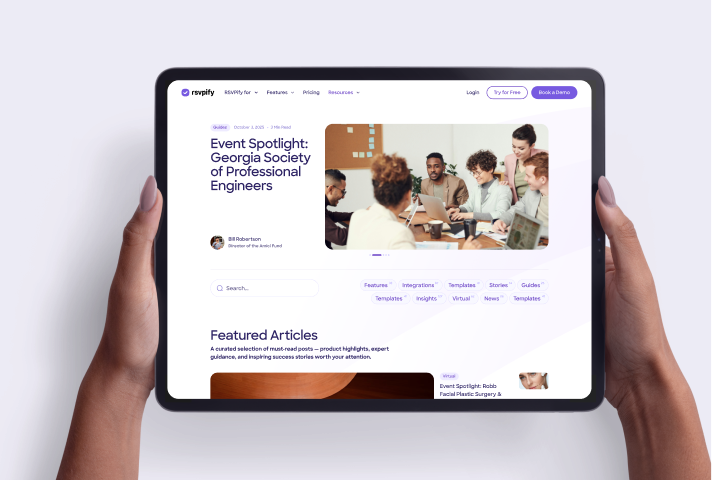As the real estate industry experiences upheaval due to rising mortgage rates, unprecedented low housing supply, landmark Supreme Court rulings, and more, realtors face more challenges than any period since the 2008 subprime mortgage crisis. While the COVID-19 pandemic certainly offered some unique challenges, historically low mortgage rates and remote work-induced relocations made that period an easier one for flipping properties.
However, the combination of ever-increasing mortgage rates and seller hesitancy has made selling homes significantly more challenging just a few years later. This means that realtors need to be both creative and organized when it comes to helping sellers market properties, and that's where open house events come in. Long an essential method for helping sellers connect with the right buyers, the importance of effective open house events is especially true in periods like now with incredibly tight buyer pools. From collecting every possible lead to follow up with, to helping overcome hesitancy with sky-high housing prices for potential buyers, successful open house events are more important than ever before.
To help you design open house events that can achieve these goals and help buyers and realtors alike, we've put together a handy open house planning checklist that includes preparation, the event itself, and the ever-important post-event period. Use this open house planning checklist as a guide or draft, with elements that can be tailored to the unique circumstances of the market you work in.
Checklist for planning an open house event
Step 1: Choose the Right Property
- Evaluate the Property: Perform an "inventory" of the target property. Identify easy fixes or repairs that could be made if possible, especially those most visible to buyers. Walk sellers through staging instructions and ensure there is a plan for presenting the house as clean and uncluttered.
- Seller Communication: Discuss the open house plans with the seller and answer any questions or concerns they have before proceeding. Ensure some fixed times to ensure no last minute cancellations that could drive away buyer attendance.
Step 2: Set a Date and Time
- Pick a Date and Time: Consider the local market, target audience, and avoid conflicting events. Weekends, especially Sunday afternoons, are usually ideal, but you may also want to consider sequential weekends if possible to offer availability for potential buyers who might be traveling or have a specific conflict weekend.
Step 3: Marketing and Promotion
- Create Marketing Materials: Design high-quality brochures, flyers, and online listings that showcase the property's best features.
- Online Advertising: Promote the open house through various online platforms, including your agency's website, social media, and real estate portals. Consider also finding community social media channels (neighborhood groups etc.) as alternative free options for additional marketing opportunities.
- Traditional Advertising: Sometimes nothing beats the good old open house yard sign! Try to find highly trafficked corners or intersections near the property to cast a wider net.
Step 4: Review the Property
- Home Staging: 1-2 days before the event, check in with the sellers to review the staging needs and confirm that necessary steps have been taken to avoid any surprises or scrambling on the day of the open house event.
- Safety Measures: Ensure sellers secure valuable items, lock away personal information, and take any needed safety measures for accessibility during the event.
- Lighting and Ambiance: Create a welcoming atmosphere with well-lit rooms, pleasant scents, and soft music.
Step 5: Gather Essential Supplies
- Sign-in Sheets: Prepare sign-in sheets to collect visitor information. Consider setting up a tablet or digital registration form to make it even easier and add a professional feel to the event.
- Information Packets: Have detailed information packets about the property and local amenities for potential buyers.
- Refreshments: Offer light refreshments, like water and snacks, to keep visitors comfortable. For higher-end properties, consider "leveling up" the amenities to make the property and open house event experience particularly memorable. This is helpful not only for this experience, but for developing potential future leads.
Step 6: On the Day of the Open House
- Arrive Early: Arrive at the property at least an hour before the scheduled start time to make final preparations.
- Welcome Sign: Place a welcoming sign outside the property.
- Greet Visitors: Greet visitors as they arrive and provide them with information packets.
- Property Tour: Offer guided tours, highlighting the property's unique features.
- Engage with Visitors: Answer questions, build rapport, and obtain feedback from potential buyers.
Step 7: Follow-up
- Collect Visitor Information: Ensure all attendees sign in, and collect their contact details.
- Follow-Up Plan: Have a follow-up plan in place to reach out to potential buyers and provide additional information.
- Seller Feedback: After the open house, communicate with the seller to provide feedback and discuss the next steps.
